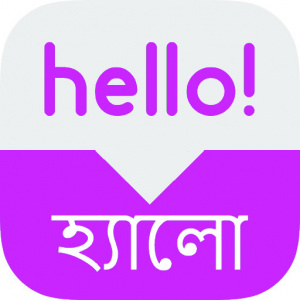Difference between revisions of "Language/Bengali/Vocabulary/How-to-Say-Hello-and-Greetings"
< Language | Bengali | Vocabulary
Jump to navigation
Jump to search
| Line 14: | Line 14: | ||
Let’s get started! 🤗 | Let’s get started! 🤗 | ||
__TOC__ | __TOC__ | ||
==Greetings== | ==Greetings== | ||
{| class="wikitable sortable" | {| class="wikitable sortable" | ||
!''' | !'''Bengali (Writing)''' | ||
!'''Bengali''' | !'''Bengali (pronunciation)''' | ||
!'''Translation''' | |||
|- | |||
|হ্যালো | |||
|Hyalo | |||
|Hello (on phone) | |||
|- | |- | ||
|নমস্কার৷ | |নমস্কার৷ | ||
|nomoskaar | |||
|General greeting (for Hindus'')'' | |||
|- | |- | ||
|অস্সলামু অলযকুম৷ | |অস্সলামু অলযকুম৷ | ||
|assalamu alaikum | |||
|General greeting (for Muslim) | |||
|- | |- | ||
|অলযকুম অস্সলামু৷ | |অলযকুম অস্সলামু৷ | ||
|walaikum assalam | |||
|reply to অস্সলামু অলযকুম | |||
|- | |- | ||
|সুপ্রভাত৷ | |সুপ্রভাত৷ | ||
|shuprovat | |||
|morning greeting | |||
|- | |- | ||
|শুভ অপরাহ্ন৷ | |শুভ অপরাহ্ন৷ | ||
|shubh oporanho | |||
|afternoon greeting | |||
|- | |- | ||
|তুমি কেমন আছ? | |তুমি কেমন আছ? | ||
|tumi kemon āccho | |||
|how are you? informal to one person | |||
|- | |- | ||
|কেমন আছেন? | |কেমন আছেন? | ||
|kemon ācchen | |||
|how are you? | |||
|- | |- | ||
|আপনি কেমন আছেন? | |আপনি কেমন আছেন? | ||
|āpni kemon ācchen | |||
|how are you? | |||
|- | |- | ||
|আপনি কেমোন আচ্ছেন? | |আপনি কেমোন আচ্ছেন? | ||
|āpani kemon āccho | |||
|how are you? formal to one person | |||
|- | |- | ||
|আপনারা কেমোন আচ্ছেন? | |আপনারা কেমোন আচ্ছেন? | ||
|āpanārā kemon āccho | |||
|how are you? formal to a group of people | |||
|- | |- | ||
|তুই কেমোন আচ্ছিশ? | |তুই কেমোন আচ্ছিশ? | ||
|tui kemon ācchis | |||
|how are you? informal to one person | |||
|- | |- | ||
|তোমরা কেমোন আচ্ছো? | |তোমরা কেমোন আচ্ছো? | ||
|tomarā kemon āccho | |||
|how are you? informal to a group of people | |||
|- | |- | ||
|তোরা কেমোন আচ্ছিশ? | |তোরা কেমোন আচ্ছিশ? | ||
|tora kemon ācchis | |||
|how are you? informal to a group of people | |||
|- | |- | ||
|ভালো৷ | |ভালো৷ | ||
|bhālo | |||
|reply to তুমি কেমন আছ and আপনি কেমন আছেন | |||
|- | |- | ||
|আমি ভালো আছি৷ | |আমি ভালো আছি৷ | ||
|āmi bhālo ācchi | |||
|reply to তুমি কেমন আছ and আপনি কেমন আছেন | |||
|- | |- | ||
|স্বাগতম৷ | |স্বাগতম৷ | ||
| | |shagotam | ||
|welcome greeting to a visitor | |||
|} | |} | ||
Revision as of 21:28, 9 November 2021
🤗 Bengali Greetings for Everyday Life
Hi Bengali learners! 😃
Do you want to learn how to say “Hello” in Bengali?
Greetings are an important part of any language because they allow you to connect and communicate with others.
If you’re planning a trip to the country or are trying to learn Bengali, keep reading to discover some of the most important greetings.
Let’s get started! 🤗
Greetings
| Bengali (Writing) | Bengali (pronunciation) | Translation |
|---|---|---|
| হ্যালো | Hyalo | Hello (on phone) |
| নমস্কার৷ | nomoskaar | General greeting (for Hindus) |
| অস্সলামু অলযকুম৷ | assalamu alaikum | General greeting (for Muslim) |
| অলযকুম অস্সলামু৷ | walaikum assalam | reply to অস্সলামু অলযকুম |
| সুপ্রভাত৷ | shuprovat | morning greeting |
| শুভ অপরাহ্ন৷ | shubh oporanho | afternoon greeting |
| তুমি কেমন আছ? | tumi kemon āccho | how are you? informal to one person |
| কেমন আছেন? | kemon ācchen | how are you? |
| আপনি কেমন আছেন? | āpni kemon ācchen | how are you? |
| আপনি কেমোন আচ্ছেন? | āpani kemon āccho | how are you? formal to one person |
| আপনারা কেমোন আচ্ছেন? | āpanārā kemon āccho | how are you? formal to a group of people |
| তুই কেমোন আচ্ছিশ? | tui kemon ācchis | how are you? informal to one person |
| তোমরা কেমোন আচ্ছো? | tomarā kemon āccho | how are you? informal to a group of people |
| তোরা কেমোন আচ্ছিশ? | tora kemon ācchis | how are you? informal to a group of people |
| ভালো৷ | bhālo | reply to তুমি কেমন আছ and আপনি কেমন আছেন |
| আমি ভালো আছি৷ | āmi bhālo ācchi | reply to তুমি কেমন আছ and আপনি কেমন আছেন |
| স্বাগতম৷ | shagotam | welcome greeting to a visitor |
